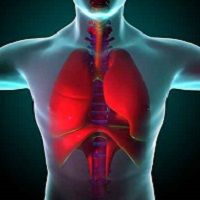Good News on Treating Persistent Sinus Tachycardia in Lung Cancer
Lung cancer patients who develop sinus tachycardia due to some treatments for their cancer can successfully reduce their heart rates with ivabradine, researchers in Romania report.

Persistent sinus tachycardia (PST) is often a complication for lung cancer patients.
The condition is caused by hypoxia, inflammation, and use of bronchodilators.
Ivabradine is known to reduce the condition in stable angina and heart failure, but not much has been reported on treating PST in lung cancer patients.
Reporting at the ESC 2016 Congress in Rome, Italy, Adrian Tase of the University of Pitesti, Pitesti, Romania and colleagues looked at 144 consecutive lung cancer patients who got uninterrupted ivabradine treatment (UIT) for PST.
All had been treated for at least 48 months. Patients' mean age was 55.8 years and 61.3% were male.
These patients all had reasons they could not take beta-blockers.
The comparison group had 288 comparable patients who did take beta blockers.
that patients who got UIT significantly lowered their heart rates and that
The researchers found "the most spectacular decrease of heart rate with UIT was in the group of patient with HR 111-120" .
"This effect remained stable in the long-term followup, which blood pressure, cardiac conduction, myocardial contractility were not affected," they found.
The team concluded that UIT appears to be a safe and feasible long-term therapy for treating PST in patients with lung cancer.
But they concede that larger studies are needed to confirm their findings.